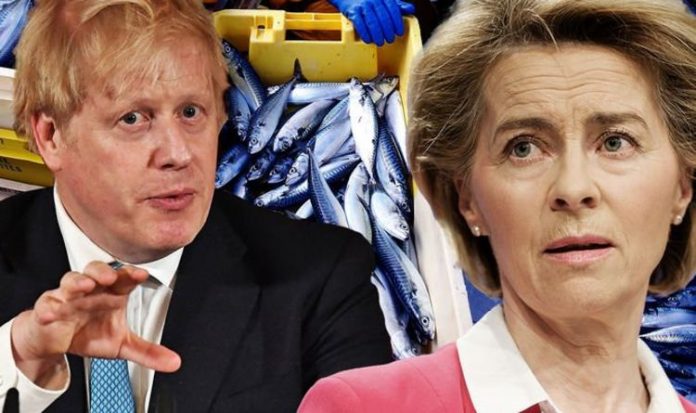An EU ban on shellfish imports from the UK has once again propelled fishing to the fore, as post-Brexit relations between the EU and Britain continue to sour. Brussels has told British fishermen they are barred indefinitely from selling live mussels, oysters, clams and cockles to EU member states. The shellfish can be transported to Europe, but only if they have been treated in purification plants. The move combined with the new bureaucracy of exporting into Europe as a result of Brexit has left many fishermen and business owners in a difficult position.
Sam Baron, owner of Baron Shellfish Limited, announced on Saturday that he was shutting down his 40-year-old family business after years of exporting lobsters and crabs to customers across the English Channel.
Earlier this week, Prime Minister Boris Johnson refused to rule out a trade war over the issue, while Government minister George Eustace condemned the EU’s action as “indefensible”.
Labour (Co-operative) MP Luke Pollard warned in March last year that UK shellfish will suffer “disproportionately” under Brexit.
He wrote for The House magazine that shellfish was a “hidden secret” as the vast majority (80 percent) are exported to the EU.
Mr Pollard wrote: “Crabs and lobsters landed around the UK receive the highest prices when shipped via vivier lorries (trucks designed to ship shellfish from harbour to market).”
He added that uncertainty and frustration was “palpable” among those in the industry ahead of Brexit, and raised concerns over whether “lucrative EU markets can be replaced”.
Mr Pollard also warned fishermen could “suffer” from a disorderly or rushed Brexit.
This week, French MEP and Chair of the European Parliament’s Committee on Fisheries – Pierre Karleskind – said only Brexit is to blame for the complications.
He said: “Well, this mess has a clear name, Brexit, this is the only (thing) responsible for that.
“Protecting the European consumer is the duty of the European Commission so there is really nothing new in that area.
“You have to understand that importing living animals is really sensitive for any country.”
READ MORE: Brexit fisheries chaos as Dutch warn ‘many will go bankrupt’
Last week, representatives of British fishermen said they had been “devastated” by recent developments after Brexit, and called on the Government to fix the problem.
Barrie Deas, chief executive of the National Federation of Fishermen’s Organisations, said: “This is devastating for those involved, and it cannot be left as a closed issue.
“Those of our members who produce mussels and cockles in particular are affected and are very seriously impacted – no exports to the EU as the UK is now a third country.
“This has to be sorted at government-to-government level and our understanding is that talks are under way, but so far without producing a satisfactory outcome.”
Alistair Sinclair, chair of the Scottish Creel Fishermen’s Federation, blamed French President Emmanuel Macron as well as the UK Government for the difficulties, and warned that they were a foretaste of future negotiations.
DON’T MISS
Brexit: Scots warns ‘not a single French boat will fish in UK’ [INSIGHT]
Brexit fisheries row: EU taunted ‘we will fish in your waters’ [ANALYSIS]
Brexit fishing war: UK warned it ‘can’t control its fish’ [INSIGHT]
He said: “This is possibly a demonstration of the difficulties that lie ahead should the UK think they are truly going to take control of their waters.
“We are on a hiding to nothing as Europe will do all they can to protect opportunities for their fishing fleets.
“Throughout the whole run-up to Brexit, our voice was not considered by the Scottish government and indeed the Tory grandees.”
The UK’s trade deal with the EU has resulted in changes to the fishing quotas enjoyed by European vessels in British waters.
The deal ensures that 25 percent of EU boats’ fishing rights in UK waters will be transferred to the British fleet over a period of five years.
After that, annual negotiations will decide how the catch is shared out between the UK and EU, and Britain would have the right to completely exclude EU boats after 2026.
The process of negotiating this outcome did not come without tension as France, led by Mr Macron, threatened at one stage to block the trade agreement.







